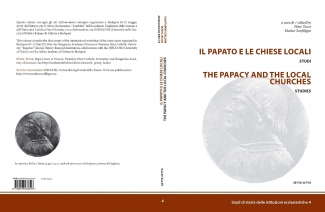After the international workshop "Il Papato e le Chiese locali – The Papacy and the local Churches" (organised on 9-10 May 2013, Budapest) and the publishing of the book containing the studies and lectures which were presented there, it can be accessed in full length through this link.
2018
-
2018. January 15.
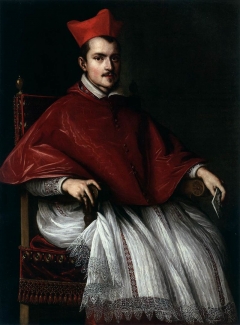
The cardinal protectors were important representation members of various states in Europe. An international cooperation project between Università della Tuscia (Prof. Gaetano Platania, Prof. Matteo Sanfilippo), Università di Chieti-Pescara (Prof. Irene Fosi), Escuela Española de Historia y Arqueología en Roma - CSIC (Prof. Rafael Valladare) and the Vilmos Fraknói Vatican Historical Research Group resulted in two workshops so far, the first one was held on February 2017, the second on November 2017.
The results of the studies will be published under the works of Edizioni Sette Città and the Fraknói Research Group.
-
2018. February 1.
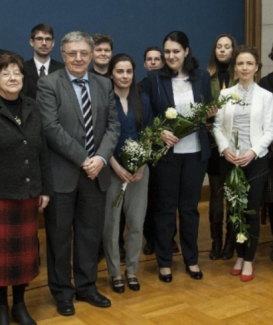
The Youth Award of the Hungarian Academy of Sciences was granted to Krisztina Tóth (research fellow of the Fraknói Research Group) for her application work "The History of the Diocese of Szombathely under the Church Governance of József Grősz (1936–1944)" on 31 January 2017.
-
2018. February 8.
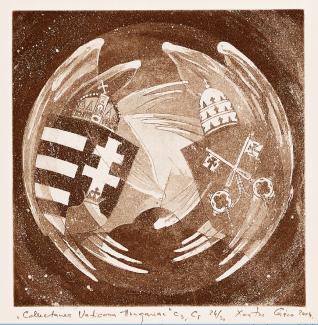
Starting February this year, you can follow the research group also on Instagram and Twitter, besides our Academia.edu and YouTube presence. The primary content channel will still be our website institutumfrankoi.hu, and the publication list of the members of the research group can be accessed through MTMT.
-
2018. February 14.
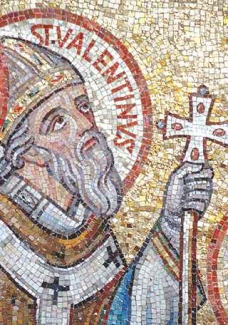
Ádám Porubszky, assistant research fellow of the Fraknói Research Group gave an interview on M1 TV channel about the origins of Saint Valentine's Day on 14 February. The interview can be seen here from 11:10.
-
2018. February 18.
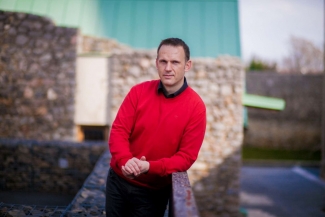
Tamás Fedeles (senior research fellow) gave an interview on Újkor.hu about his church history and Vatican related research.
-
2018. February 27.

The eponym of our research group, Vilmos Fraknói was born on 27 February 1843. His family name was Frankl, which he changed to the more Hungarian sounding Fraknói after the death of his father in 1874. He became a catholic priest, and he played a big role in Hungarian historical research and the Hungarian Academy of Sciences. He became a correspondant member of the Academy when he was only 27 years old, and three years later he became a full member. In May 1879 he became the secretary general of the Hungarian Academy of Sciences, and he stayed in the position for 10 years.
He made great efforts to collect sources of Hungarian history from Italian church and state archives. One of his major achievements was the organisation of Hungarian historical research in the Vatican, the launch of the series Monumenta Vaticana Hungariae, and the establishment of the Hungarian Institute of History in Rome.
On occasion of his birthday anniversary, our research group held a commemoration and wreath laying at his grave.
-
2018. March 23.
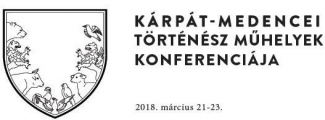
The Kubinyi András Historian Workshop organised a conference between 21–23 March 2018 at the Pázmány Péter Catholic University in Piliscsaba. Three members of our research group also participated and gave lectures as well.
Leader of the Fraknói Research Group Péter Tusor was the chairman of the section medieval and early modern period in Hungary. Terézia Horváth, assistant research fellow, of the research group gave a lecture on the Beneéthy and Nyási formulary book, which were the representatives of the synthesis of the late Middle Ages ecclesiastical law in Hungary. She also compared the two variants with each other, explaining the causes and circumstances of the similarities and the differences between them.
Viktor Kanász, assistant research fellow, analysed the church relations during the 16th century in the Hungarian town Kanizsa. He pointed out the importance of the thesis of confessionalisation, which also contradicts the long believed fact that the reformation could be attached with fix dates, rather than the idea that confessions lived and developed parallel with eachother. He proved the latter was more accurate in the example of Kanizsa as well.
Assistant research fellow Ádám Porubszky compared the two images of the Counts of Cilli in Hungarian and Slovenian historiography. Until the second half of the 20th century the dynasty was the symbol of evil, manipulative and alien nobles not just for historians, but dramatists and writers alike in Hungary. On the other hand, former historians related to Slovenia had romantic and nationalistic approach towards the Counts, whom they long considered the medieval representations of the Slovene nation at the time.
-
2018. April 3.

Róbert Oláh gave an interview (from: 2:26:16) about the history of Easter in the Hungarian Television (M1).
-
2018. April 25.
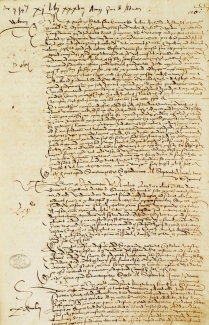
Our research group published the new volume of Collectanea Vaticana Hungariae. The "Regesta Supplicationum, 1522–1523. The Supplications Relating to the Kingdom of Hungary Approved under Pope Hadrian VI" by Bálint Lakatos is a collection of the supplications and requests addressed to the pope. The book was published under the cooperation of the Fraknói Research Group and the Hungarian Medieval Research Group. The first presentation of the book will happen during the third workshop of our research group, on 18 May 2018, at Pázmány Péter Catholic University, Sophianum I. floor room 111. at 16:00.
-
2018. May 3.
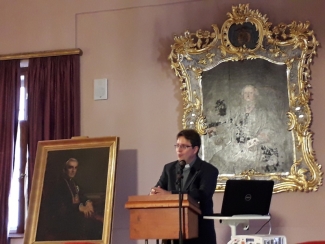
Máté Gárdonyi, external member of the Fraknói Research Group, gave a lecture at the Lajos Szmrecsányi Memorial Conference in Eger on 3 May 2018. The conference, which had been organised by the Archdiocese of Eger, was dedicated for the 75th anniversary of the death of archbishop Lajos Szmrecsányi.
In his lecture, Máté Gárdonyi analysed the ad limina reports made by Lajos Szmrecsányi in 1928, which clearly show the daily struggles and situation of the archdiocese.
-
2018. May 7.
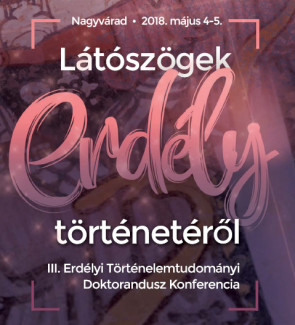
Viktor Kanász, assistant research fellow of the research group, gave a lecture (Girolamo Martinengo, the nuncio to the court of Ferdinand and Process of György Fráter’s murder) about György Fráter (Georgius Martinuzzi) at the conference "Viewpoints on the history of Transylvania" in Nagyvárad (Oradea).
-
2018. May 8.
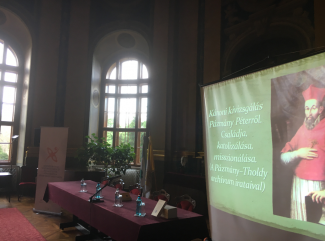
Péter Tusor, leader of the research group, and Viktor Kanász, assistant research fellow, gave lectures in Nagyvárad (Oradea) on 8 May 2018 due to the presentation of the book "Péter Pázmány’s Process of Enquiry. His Family, Catholicisation, Missions (With the Papers of the Pázmány–Tholdy Archives)".
In his lecture, Viktor Kanász, assistant research fellow, pointed out the relations in the book with Várad, the birthplace of Péter Pázmány. He was followed by Péter Tusor, leader of the research group, who gave more insight to the connections which Pázmány and his family had with Nagyvárad and the territory adjacent to it during their history.
-
2018. May 11.
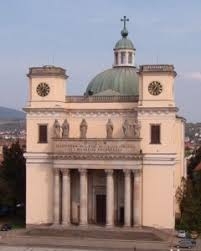
-
2018. May 11.
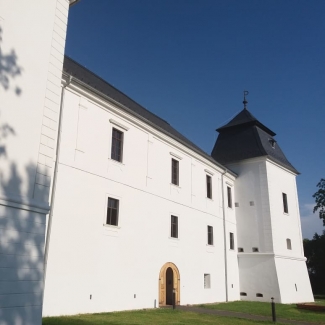
Viktor Kanász, assistant research fellow, gave a lecture on the siege of Kanizsa in 1601, during the roving conference in Egervár organised by the Castrum Bene organisation between 11-13 May 2018. In his lecture, he presented the results of his studies based on the Italian (from Mantua, Modena and the Vatican) sources which him and Márton Szovák examined.
-
2018. May 18.

Péter Tusor, leader of the Fraknói Research Group, gave a lecture on the Hungarian M5 TV channel at the show Mindenki Akadémiája ("Everyone's Academy") on 18 May 2018. In his lecture, he talked about the political aspects of Péter Pázmány's appointment to archbishop of Esztergom and the diplomatic sources he studied in the Vatican Secret Archives.
-
2018. May 18.
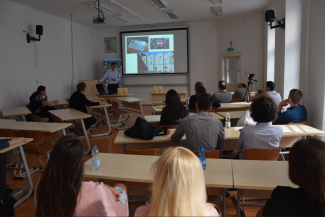
The Fraknói Research Group held it's third workshop on 18 May 2018, where the new book Regesta Supplicationum was presented by the author, Bálint Lakatos. The book consists the supplications related to Hungarian cases which were sent to the Pope between 1522–1523.
Péter Tusor, leader of the research group, welcomed the audience, and he praised the volume's achievements and named it as a starting point for future research towards processing the Hungarian related supplications in the Vatican Secret Archives..
Bálint Lakatos, author of the book, introduced his research and the methodology he used to organise and process the overwhelming number of documents he faced. He pointed out that it will be necessary in the future to include more researchers in the subject, due to the sheer number of the sources.
-
2018. May 25.
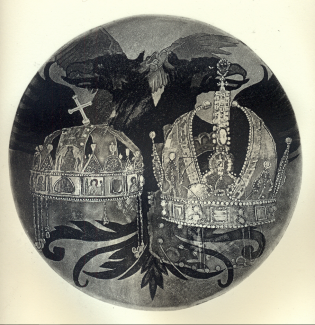
The presentation of the „Publikationen der Ungarischen Gesichtsforschung in Wien” (PUGW) series took place on the 25th May 2018 in the Council-chamber of the MTA BTK TTI (Hungarian Academy of Sciences, Research Centre for the Humanities, Institute of History). The PUGW is the alter idem of the Collectanea Vaticana Hungariae series that started in 2004, five years earlier than this series.
The presentation of the fifteen volumes which were published under the series started with Pál Fodor's (director of MTA BTK) speech, in which he praised the effort of publishing the Hungarian historical accomplishments for foreign readers.
István Fazekas, associate professor at ELTE BTK, explained the motives and the goal of the series, which delivered it's first volume in 2009. Similar to the Collectanea Vaticana Hungariae, which started in 2004 by Péter Tusor and contributes to the Hungarian research in the Vatican, the series is responsible for the supporting and publishing of projects and results related to Hungarian research in Vienna. The typographical similarities between the two series are obvious, and the first, third and fourth volume were made by the same editorship. In addition, the eighth volume was made with the support of the Lendület-programme, and it contains Vatican-related material as well.
Csaba Szabó, director of MNL (Hungarian States Archives) praised the series for giving an opportunity to young researchers to publish their first foreign language publications. He also had high hopes towards the idea of the cultural policy supporting these projects.
Iván Bertényi Jr, director of the Hungarian Historical Institute of Vienna, talked about the upcoming volumes within the series and the challenges which come from the distribution of the issues.
The series and all it's volumes can be accessed through the webpage of the MTA BTK TTI here.
-
2018. June 8.
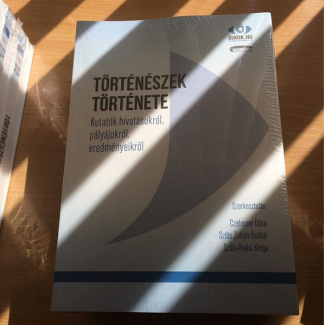
Újkor.hu, a cooperating partner of the Fraknói Research Group, presented it's new book "Történészek története" ("History of historians") on 8 June 2018. It contains interviews with Hungarian historians, among them with Péter Tusor, leader of the Fraknói Research Group.
The authors of the book, Kinga Szőts-Rajkó, Zoltán Oszkár Szőcs and Dóra Czeferner talked about their experiences related to the interviews, and the heading called "Portrait" at the website Újkor.hu which is the platform where the interviews first appeared. One of their goals was to ask questions in the interviews which could help students and young historians in their way of research and to learn methodology from experienced historians.
-
2018. June 8.
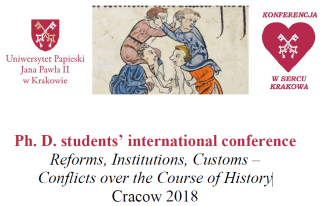
Viktor Kanász, assistant research fellow of the Fraknói Research Group, gave a lecture at The Pontifical University of John Paul II in Krakow, at the international conference Reforms, Institutions, Customs –Conflicts over the Course of History which was held between 7–8 June 2018. In his lecture, he enlightened the circumstances of the murder of György Fráter (Georgius Martinuzzi), and the following enquiry at the Holy See. (The article is available here.)
-
2018. June 15.
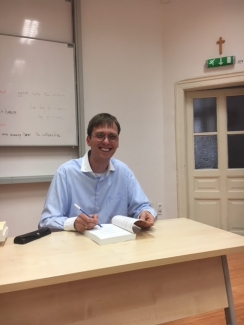
Péter Tusor, leader of the Fraknói Research Group, gave an interview on the Vatican Radio about Bálint Lakatos' new book Regesta Supplicationum.
The interview can be accessed here.
-
2018. July 23.
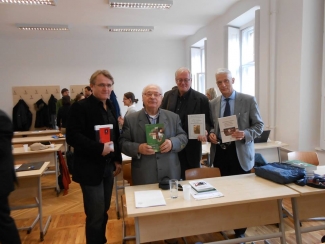
S.I. Ferenc P. Szabó gave an interview on the Vatican Radio due to the launch of his new book, and he also gave his remarks on some of the achievements found in the volume of our research group, Pázmány, the Jesuit Prelate.
The interview can be accessed here.
-
2018. July 24.
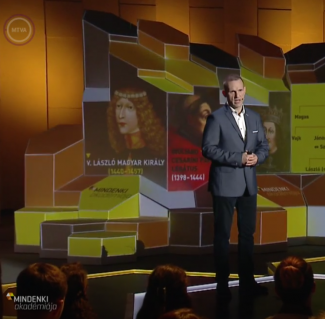
Tamás Fedeles, senior research fellow of the Fraknói Research Group, gave a lecture on the Hungarian M5 TV channel at the show Mindenki Akadémiája ("Everyone's Academy") about the fight of the late medieval Hungary against the Ottoman Empire.
-
2018. August 7.
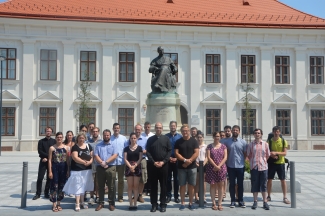
The fourth Fraknói Summer Academy was organized in Vasvár and Szombathely between 2–5 August 2018 with scientific lectures concerning church history.
On the first day, the participants were welcomed by Péter Tusor, Máté Gárdonyi and Viktor Kanász, curators of the summer academy, and Balázs Zágorhidi Czigány, director of the local Historical Collection of the Dominican Order in Vasvár. Kornél Szovák gave his lecture about the formulary book of Esztergom.
On the second day, more lectures followed. The full programme can be viewed in the links.
The summer academy was sponsored by the Pázmány Péter Catholic University.
-
2018. August 21.
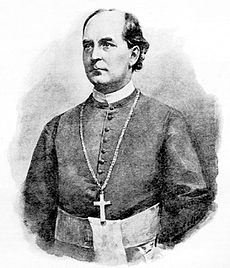
Péter Tusor, leader of the Fraknói Research Group, gave an interview on the Hungarian Catholic Radio about the works of the research group.
The interview can be accessed here.
-
2018. September 6.
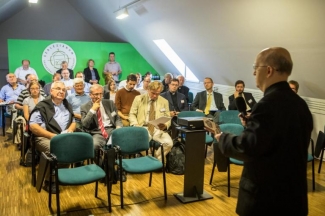
Péter Tusor, leader of the Fraknói Research Group, gave a lecture titled "Episcopal processes related to Veszprém in the Vatican Archives" on 6 September 2018 in Veszprém at the conference "Gaining strength and resumption – the Diocese of Veszprém in the 17th century". External member of the research group, Máté Gárdonyi played a role at the conference being a section moderator as well.
-
2018. September 10.
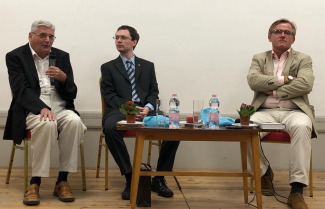
The Diary of Kelemen Király OFM (1944–1947) was published and presented in Budapest and Csongrád on 10 September and 9 October 2018.
The editor of the new book was György Sági, external member of the Fraknói Research Group. Péter Tusor, leader of the research group, and Mons. József Török, senior research fellow, gave an insight to the origins and circumstances of the creation of the diary. The diary was first published in Cleveland 44 years ago, the current edition has an additional index and footnotes.
Pictures from the first event: 1. 2. 3. 4. 5.
Pictures from the second event: 1. 2. 3. 4. -
2018. September 28.
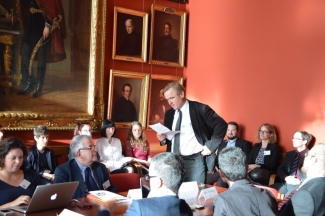
International Symposium (The Agents of foreign Communities and European-American States in Rome) was organized in Budapest from 27 to 28 September by the Fraknói Research Group and the University of Tuscia DISUCOM (Viterbo). Lectures at the symposium discussed the questions related to the agents who had represented their local church's affairs at the Holy See in the early modern period.
-
2018. October 9.
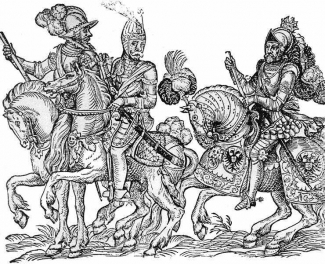
Several of our research group's members gave lectures at the conference "György Thúry Memorial Conference" in Nagykanizsa on 9 October 2018.
Tamás Kruppa, senior research fellow of the research group, presented the details he discovered in the Vatican Archives about the unsuccessful siege of Kanizsa in 1601, specifically the actions of the mercenary army of Francesco Aldobrandini.
Viktor Kanász, assistant research fellow, gave insight into the 16th century town of Kanizsa, and he analysed the relations between the confessions and their development at the area.
Márton Szovák gave a lecture about the contents of a newly discovered source, the military strategy plan of Federico Ghislieri, which he made after the unsuccessful siege of Kanizsa in 1601.
-
2018. October 15.
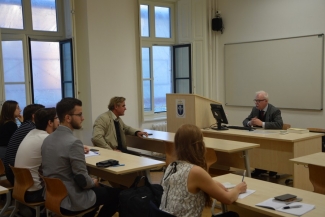
Paul Shore, adjunct professor of the University of Regina in Canada, gave a lecture on 15 October 2018 at the Pázmány Péter Catholic University. The event was organised by the Fraknói Research Group.
In his lecture "Two Hungarian Jesuits and the Qur'an: Understanding, Misunderstanding, and Polemic", he presented the roles of two Hungarian jesuits, namely István Szántó and Péter Pázmány, in the religious debate between catholicism and islam.
-
2018. October 17.
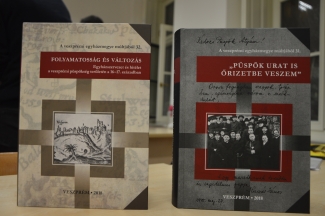
The Fraknói Research Group organised the presentation of two books about the history archdiocese of Veszprém on 17 October 2018 at the Pázmány Péter Catholic University. Gábor Nemes, research fellow of the Fraknói Research Group, and Viktor Kanász, assistant research fellow also wrote studies in one of the books. These studies can be accessed here and here.
Full details of the books:
„Püspök urat is őrizetbe veszem.” Források a veszprémi egyházmegye háborús veszteségeiről II. (szerk.: Varga Tibor László). Veszprém, 2018. (A veszprémi egyházmegye múltjából 31.)
Folytonosság és változás. Egyházszervezet és hitélet a veszprémi püspökség területén a 16–17. században (szerk.: Karlinszky Balázs – Varga Tibor László). Veszprém, 2018. (A veszprémi egyházmegye múltjából 32.)
-
2018. October 31.
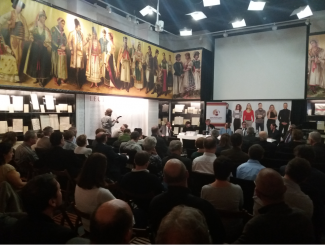
Péter Tusor, leader of the Fraknói Research Group participated at the closing event of the "Reformation MNL" project at the National Archives of Hungary. He presented the new book of the project [„...mi úgymond mennyei polgárok vagyunk” - Válogatás a magyarországi protestantizmus történeti emlékeiből a Magyar Nemzeti Levéltárban (ed. Eleonóra Kovács). Budapest, 2018.], and also related it's content to the confessionalitation theory of Wolfgang Reinhard.
-
2018. November 7.
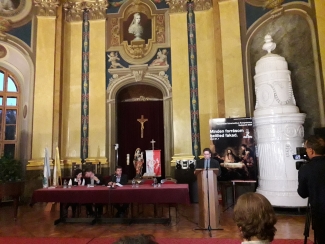
Máté Gárdonyi, external member of the Fraknói Research Group, and Krisztina Tóth, research fellow, gave lectures at the conference "Self Identity, Role and Activity in the Ecclesiastical Society from the 18th to the 20th century" between 8–10 November 2018 in Nagyvárad.
Máté Gárdonyi discussed the two sides of Pope Paul VI in his lecture "The Office of Peter and the Personal Habit. The Papacy of Paul VI." Krisztina Tóth gave a lecture about archbishop József Grősz' pastoral strategies, and also the limits and boundaries of his opportunities.
-
2018. November 9.
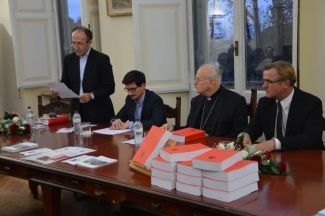
Our research group presented it's latest volume "Formularium Ecclesiae Strigoniensis" in Rome on 7 November 2018.
Editors of the book were cardinal Péter Erdő, Kornél Szovák and Péter Tusor. Contributors were Gábor Sarbak, Gyula Mayer, Terézia Horváth (assistant research fellow of the Fraknói Research Group), Ádám Porubszky (assistant research fellow), Viktor Kanász (asssitant research fellow), Krisztina Tóth (research fellow), Ágnes Gátas-Palotai (assistant research fellow), Szilvia Somogyi, and the MTA-ELTE-PPKE Research Centre for Ancient Studies.
The volume publishes two codices, the Beneéthy and the Nyásy-codex, which can be considered as the representations of the synthesis of the late Middle Ages ecclesiastical law. More information about the volume and parts of the book can be accessed here.
-
2018. November 15.
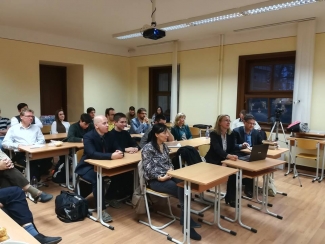
Viktor Kanász, assistant research fellow of the Fraknói Research Group, gave a lecture at the conference "The Science is for Everyone – Conference on the Scientific Communication" organised in Debrecen between 13-14 November 2018.
The conference discussed the questions such as how to make a study more appealing towards the audience, how to grab their attention, what makes a topic interesting, and how to keep the professionality of a lecture or study when it is meant for a wider audience group. Related to this, Viktor Kanász presented the social and science communication activities of the Fraknói Research Group in his lecture "From Vilmos Fraknói to Instagram – Church History and Science Propagation".
-
2018. November 16.
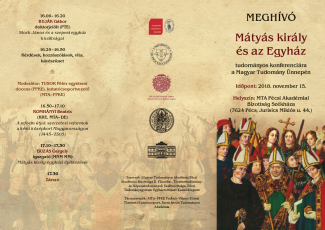
For the 575 year anniversary of the birth of Matthias Corvinus, the conference "Matthias Corvinus and the Church" was organised on 15 November 2018 in Pécs. The lectures explained the issues about the clerics in the time of Matthias Corvinus, the ecclesiastical society and the structure of the Church and its development in the era.
Péter Tusor, Tamás Fedeles and Terézia Horváth, members of our research group gave lectures.
-
2018. December 13.
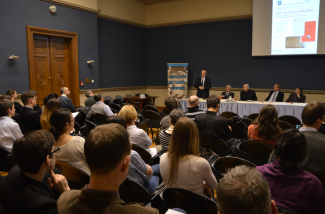
Not long after the event in Rome, the research group presented it's newest volume at the Hungarian Academy of Sciences on 13 December 2018.
The "Formularium Ecclesiae Strigoniensis" publishes two codices from the early 16th century, the Beneéthy and the Nyásy-codex, one of the most important ecclesiastical law handbooks of the era from the Archidiocese of Esztergom.
Péter Tusor, leader of the Fraknói Research Group, welcomed the audience and gave an insight to the process and circumstances which were necessary for the volume to be published, such as the Church History Research Group established by cardinal Péter Erdő in 1999.
László Solymosi, full member of the Hungarian Academy of Sciences, praised the volume and gave details about the formulary books in Hungary.
Norbert C. Tóth, senior research fellow of the Hungarian Medieval Research Group (MTA-HIM-SZTE-MOL) stated that the formulary is a lot more than it would first seem to us, due to the fact that it consists not just texts related to the ecclesiastical jurisdiction in Esztergom, but private material of archbishop Tamás Bakóc as well. He also described the scale of the work done by Kornél Szovák enormous.
Cardinal Péter Erdő discussed the relations of the book with the canon law. He also tried to answer the question what was the reason behind the creation of the second variant of the already usable Beneéthy-codex in Esztergom.
Finally, Kornél Szovák explained the process and methodology he used for the work, and also raised the question about the theoretical quantity of sources which remained from the Middle Ages for the present day. Pál Engel previously stated that approximately 2% of the original number of documents remained to us, but this new formulary could bring up the assumption that this could be even lower (1 or even 0,5%), claimed Szovák.

